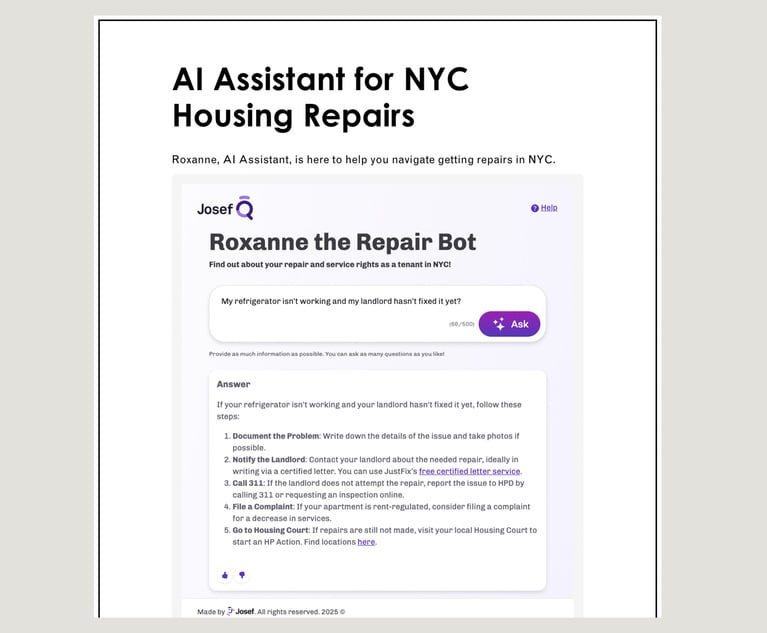 Voting at a polling place on Trinity Place
Voting at a polling place on Trinity Place091410
Challenge to Purge of NY Voter Rolls May Continue, Judge Decides
U.S. District Judge Alison Nathan said in a decision that while the section of state election law that allowed the purge may not be unconstitutional, the way it was applied by the state is less clear.
October 01, 2018 at 06:38 PM
5 minute read
A lawsuit spurned after thousands of voters were purged from local polling books before the 2016 elections will move forward after a federal judge partly rejected a motion to dismiss the litigation from the state Board of Elections.
U.S. District Judge Alison Nathan of the Southern District of New York said in her decision that while the section of state election law that allowed the purge may not be unconstitutional, the way it was applied by the state is less clear.
The lawsuit was brought last year by Common Cause, a government reform group, which claimed the state was not complying with a section of the National Voter Registration Act that outlines the procedure a state must follow before it can remove a voter from the rolls.
A section of state election law provides that if mail sent to a voter is returned as undeliverable, and that voter does not respond to a follow-up confirmation, they are then moved to what's called “inactive” status. That's when a voter is still registered to vote in the state but removed from the poll books.
Those voters will not find their name in the books when they show up on Election Day, but they can still vote using an affidavit ballot. Common Cause alleged that the practice is the “functional equivalent” to removing a voter from the registration list, and conflicts with the NVRA.
The relevant section of the NVRA says a state may not remove a registered voter from the official list unless that voter confirms in writing that they have moved or if they fail to respond to a notice seeking confirmation and do not vote in two consecutive general elections for federal office.
The Board of Elections argued that its process of moving a voter to “inactive” status does not contradict the NVRA since it does not technically remove those voters from the registration list at that time. Common Cause said in filings that marking a voter as “inactive” is confusing and impedes an individual's voting process. Someone could get to the polls and be told she is not on the list and not realize she can vote by affidavit ballot, for example.
Nathan did not disagree with either argument, holding that the facial challenges to the state law from Common Cause should be dismissed while the as-applied challenge may continue.
On the former challenge, Nathan said that the state's law meets the requirements of the NVRA, even if it may not appear so to the average voter.
“The Court concludes that New York's treatment of its official list does not amount to a circumvention of federal law,” Nathan wrote. “Defendants' definition of 'official list' serves two of the NVRA's explicit statutory purposes—maintaining the accuracy of voter rolls and the integrity of the electoral process.”
The latter challenge may have been out of the hands of the Board of Elections in some cases, but still falls under its responsibility. Common Cause claimed that poll workers “routinely” told voters marked as “inactive” that they were actually no longer registered to vote and did not tell them they could vote using an affidavit ballot. The group also said poll workers only allowed an affidavit ballot when a voter insisted on it and in some cases did not count those ballots.
“If the State does not inform or permit inactive voters to cast an affidavit ballot, or if its poll workers are not informed of their right to do so, then the State fails to comply with the express terms of [the law], and in so doing it fails to protect inactive voters from being denied the protections of the official list of eligible voters—in Plaintiffs' terms, de facto removal,” Nathan wrote.
Common Cause is represented in the lawsuit by the Lawyers' Committee for Civil Rights Under Law. Kristen Clarke, president of the LCCRUL, said in a statement that the decision highlights the need for a change in the state's election law.
“The court's ruling recognizes that all voters have access to protection under the National Voter Registration Act if they are denied an equal opportunity to participate in the political process,” Clarke said. “But much work remains to be done to combat the effects of New York's antiquated voting laws and procedures and ensure that every legitimate voter can exercise his or her fundamental rights.”
Dechert and LatinoJustice PRLDEF are also working on the case with the LCCRUL.
A spokesman for the state Board of Elections was not available for comment Monday evening.
READ MORE:
This content has been archived. It is available through our partners, LexisNexis® and Bloomberg Law.
To view this content, please continue to their sites.
Not a Lexis Subscriber?
Subscribe Now
Not a Bloomberg Law Subscriber?
Subscribe Now
NOT FOR REPRINT
© 2025 ALM Global, LLC, All Rights Reserved. Request academic re-use from www.copyright.com. All other uses, submit a request to [email protected]. For more information visit Asset & Logo Licensing.
You Might Like
View All
Meet the Long Island Judge Tapped to Be US Attorney for Eastern District of New York
2 minute read
New York’s Property Tax Incentives and Abatements Make Development Feasible
7 minute read
Josef Partners With NYU, Housing Court Answers to Launch AI Assistant Built for Tenants

Trending Stories
- 1The Importance of Contractual Language in Analyzing Post-Closing Earnout Disputes
- 2People in the News—Jan. 8, 2025—Stevens & Lee, Ogletree Deakins
- 3How I Made Partner: 'Avoid Getting Stuck in a Moment,' Says Federico Cuadra Del Carmen of Baker McKenzie
- 4Legal Departments Dinged for Acquiescing to Rate Hikes That 'Defy Gravity'
- 5Spalding Jurors Return $12M Verdict Against State Farm Insurance Client
Who Got The Work
Michael G. Bongiorno, Andrew Scott Dulberg and Elizabeth E. Driscoll from Wilmer Cutler Pickering Hale and Dorr have stepped in to represent Symbotic Inc., an A.I.-enabled technology platform that focuses on increasing supply chain efficiency, and other defendants in a pending shareholder derivative lawsuit. The case, filed Oct. 2 in Massachusetts District Court by the Brown Law Firm on behalf of Stephen Austen, accuses certain officers and directors of misleading investors in regard to Symbotic's potential for margin growth by failing to disclose that the company was not equipped to timely deploy its systems or manage expenses through project delays. The case, assigned to U.S. District Judge Nathaniel M. Gorton, is 1:24-cv-12522, Austen v. Cohen et al.
Who Got The Work
Edmund Polubinski and Marie Killmond of Davis Polk & Wardwell have entered appearances for data platform software development company MongoDB and other defendants in a pending shareholder derivative lawsuit. The action, filed Oct. 7 in New York Southern District Court by the Brown Law Firm, accuses the company's directors and/or officers of falsely expressing confidence in the company’s restructuring of its sales incentive plan and downplaying the severity of decreases in its upfront commitments. The case is 1:24-cv-07594, Roy v. Ittycheria et al.
Who Got The Work
Amy O. Bruchs and Kurt F. Ellison of Michael Best & Friedrich have entered appearances for Epic Systems Corp. in a pending employment discrimination lawsuit. The suit was filed Sept. 7 in Wisconsin Western District Court by Levine Eisberner LLC and Siri & Glimstad on behalf of a project manager who claims that he was wrongfully terminated after applying for a religious exemption to the defendant's COVID-19 vaccine mandate. The case, assigned to U.S. Magistrate Judge Anita Marie Boor, is 3:24-cv-00630, Secker, Nathan v. Epic Systems Corporation.
Who Got The Work
David X. Sullivan, Thomas J. Finn and Gregory A. Hall from McCarter & English have entered appearances for Sunrun Installation Services in a pending civil rights lawsuit. The complaint was filed Sept. 4 in Connecticut District Court by attorney Robert M. Berke on behalf of former employee George Edward Steins, who was arrested and charged with employing an unregistered home improvement salesperson. The complaint alleges that had Sunrun informed the Connecticut Department of Consumer Protection that the plaintiff's employment had ended in 2017 and that he no longer held Sunrun's home improvement contractor license, he would not have been hit with charges, which were dismissed in May 2024. The case, assigned to U.S. District Judge Jeffrey A. Meyer, is 3:24-cv-01423, Steins v. Sunrun, Inc. et al.
Who Got The Work
Greenberg Traurig shareholder Joshua L. Raskin has entered an appearance for boohoo.com UK Ltd. in a pending patent infringement lawsuit. The suit, filed Sept. 3 in Texas Eastern District Court by Rozier Hardt McDonough on behalf of Alto Dynamics, asserts five patents related to an online shopping platform. The case, assigned to U.S. District Judge Rodney Gilstrap, is 2:24-cv-00719, Alto Dynamics, LLC v. boohoo.com UK Limited.
Featured Firms
Law Offices of Gary Martin Hays & Associates, P.C.
(470) 294-1674
Law Offices of Mark E. Salomone
(857) 444-6468
Smith & Hassler
(713) 739-1250






